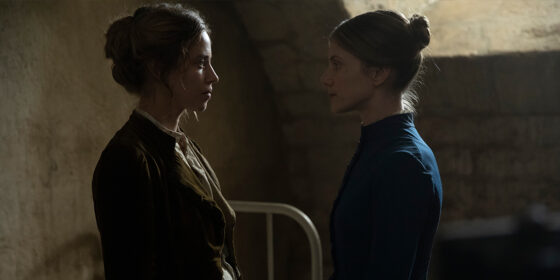TIFF 2021 | The Mad Women’s Ball (Mélanie Laurent, France)

By Katherine Connell
Despite its interest in shedding light on the patriarchal, abusive history of medicine, Mélanie Laurent’s The Mad Women’s Ball can’t help but indulge tropes that both romanticize and exploit its subject matter. An adaptation of the novel by Victoria Mas, the film follows Eugénie Cléry (Lou de Laâge), whose privileged class status in 19th-century Paris is at odds with her rebellious temperament—a wearisome cliché, albeit with the interesting twist that Eugénie can communicate with spirits from beyond the grave. While the growing popularity of spiritualism gives Eugénie an empowering context for her clairvoyance, the rest of her family finds this paranormal activity concerning. Trying to save face, Eugénie’s father commits her to Pitié-Salpêtrière, a neuropsychiatric teaching hospital under the supervision of Jean-Martin Charcot (a real historical figure, played here by Grégoire Bonnet) and his many male students.
The film’s tepid start does little more than establish the coziness of Eugénie’s family home, which will be a delight for fans of antique light fixtures. Unfortunately, it’s this same standard-issue historical fetishism that sabotages the film’s attempt to be frank about medical cruelty when its setting pivots to the Salpêtrière. Scenes of routine sexual and physical abuse inflicted on patients by their doctors are at odds with the ethereal cinematography and tidy mise-en-scène. There might be something purposeful in Laurent’s insistence on the orderly formality of the patriarchal impulse to arrange and control (Charcot’s experimental treatments are shown as punishing theatrical performances), but since the film lacks a coherent artistic vision, this potential intention simply peters out. Cringier still is the mining of the charged subject of abuse and alienation within mental health institutions to portray background characters as a quirky, stereotyped band of outcasts—dramatis personae who texture the life of a protagonist whom, in the film’s most egregious suggestion, deserves to be interned least of all.
The narrative foreground also lacks substance: ultimately, a burgeoning relationship between Eugénie and her supervisory nurse Geneviève (played by Laurent) seems to be included only in service of setting up a climactic escape scene. As with Emerald Fennell’s Promising Young Woman from earlier this year, The Mad Women’s Ball exudes a palpable desperation to embody the spirit of a zeitgeisty feminism through the deployment of weirdly outdated references: I haven’t seen the corset presented as a catch-all symbol for living under patriarchy since the first Pirates of the Caribbean (2003), and I squirmed when I saw it used here. Our takeaway boils down to a scene in which Eugénie, witnessing the damaging effects of hypnotherapy on a fellow patient, screams at her doctors, “It’s you, you’re driving her mad!” Intended as a shattering moment, this sadly encapsulates the way that the film misses the mark by not venturing beyond the most surface-level denunciations.
Katherine Connell

